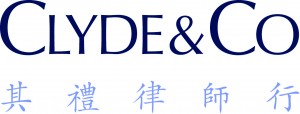5 January, 2016
In a move to champion better consumer protection in the insurance industry, on 30 July 2015, the Office of the Commissioner of Insurance (OCI) issued the new Guidance Note 16 on Underwriting Long-Term Insurance Business (“GN 16”) setting out high-level principles on the fair treatment of customers. We had a chance to talk with Clyde & Co Hong Kong’s Insurance & Reinsurance team about the implications of GN 16, and here is what they had to say.
Conventus Law: Any attempt to circumvent the requirements prescribed in GN 16 would be regarded as acting in bad faith. What are the potential legal and real-world ramifications for a business if its controllers are found to have acted in bad faith?
Clyde & Co: The OCI were troubled by what they considered to be attempts by certain industry participants to try and circumvent the intention of GN15. Therefore the OCI have for GN16 sought to include an express consequence for doing so in respect of GN16, to discourage such behaviours.
As you will see from GN16 there is a comment that if a Controller is found to be acting in bad faith, it could have an impact on the OCI's "fit and proper" assessment of such controller. Similarly the OCI notes that for Appointed Actuaries, it may constitute non –compliance with professionals standards, and therefore render the actuary not acceptable to the OCI.
Potentially therefore such Controllers/Appointed Actuaries could be excluded from the Hong Kong insurance industry, if this sanction was taken to the extreme.
We see the foregoing as a fairly severe sanction, that the OCI would be reluctant to issue, unless the actions of the relevant Controller/Appointed Actuary warranted action. However, given the concerns the OCI had re the implementation of GN15, the OCI clearly feels it needs to have such sanction available to it as a fall back.
We would think that the OCI hopes the threat of the sanction will be sufficient to encourage a compliant approach to GN16, rather than having to exercise such a sanction. However, to stay safe the industry needs to look at both the letter and spirit of GN16. They must not seek to circumvent the rules in a way that the OCI considers not to be treating customers fairly.
Furthermore, by making it clear that the sanctions can apply to Controllers and Appointed Actuaries, the OCI ensures senior management and technical personnel have a direct interest in ensuring compliance with GN 16, so that these issues are appropriately escalated and supervised.
CL: What must a controller do to ensure he/she is meeting all the requirements of GN 16 and those set forth in relevant Insurance Core Principles throughout the life cycle of all long-term insurance policies?
Clyde & Co: It is not a question of a protocol as such, or a checklist, but more of a holistic approach which ensures that each and every product is designed, marketed and distributed in a way that is fair to customers. Furthermore the after sales operations in terms of ongoing information, administration and claims handling are also to be handled fairly. As such, it is a cradle to grave concept.
Treating customers fairly is not an unduly complex concept, but it does require a mind-set that is different from that in a buyer-beware market, which no longer exists for the Hong Kong insurance industry. Treating Customers Fairly puts the treatment of customers fairly as a basic tenant of doing business throughout the life-span of the activities relating to any applicable product. This will need to be led my management, to ensure the culture applies throughout the full life cycle, with appropriate policies implemented at each and every stage of the process.
CL: GN 16 addresses the concept of “policyholders’ reasonable expectations” (“PRE“). Did GN 16 provide any clarity on defining this term?
Clyde & Co: GN16 elaborates on these points, although as they originate from Insurance Core Principles, examples from other jurisdictions may also be illustrative.
For example GN16 makes clear that it is a reasonable expectation for policyholders to expect to receive at least a fair proportion, if not all, of the non-guaranteed part of the illustrated benefits. It is the duty of the Controller, the Appointed
Actuary and the Board to ensure that such policyholders' reasonable expectation is met.
It is the continuing duty of the Appointed Actuary to advise the Board of the insurer of his or her interpretation of policyholders' reasonable expectations. For example, in the context of the provision of a benefit illustration, it is the duty of the Appointed Actuary to adopt reasonable assumptions and to provide regular and up-to-date assessments of such assumptions to the Board for making suitable amendments.
When significant changes of the underlying assumptions is likely to take place, the Appointed Actuary should take all reasonable steps to ensure that the Board appreciates the implications for the reasonable expectations of the policyholders.
Expectations should be maintained through on-going communications with policyholders at least annually as an integral part of expectation management (e.g. projections for non-guaranteed benefits in the anniversary statements).
Insurers should also monitor products (complaints, design flaws, etc.) after the launch to ensure that expectations are being met.
CL: In the past, Hong Kong insurance companies relied upon the terms and conditions of the policy to dictate their obligations to the policyholder. Once GN 16 is made effective, what changes and considerations need be made in order to determine how PRE can be measured and met?
Clyde & Co: A purely legalistic terms and conditions approach, assuming total freedom of contract, would be very dangerous under GN16. As mentioned above a holistic approach to compliance with the substance and intent of GN16 and the Insurance Core Principles which underlie it would be needed.
CL: Insurers are required to make audio-recorded post-sale confirmation calls to all vulnerable customers (i.e. those over 65 years of age, those with a primary level education or below, or those having no regular source of income) procuring life insurance products (except term insurance) or products involving investment risks. What is the goal with the post-sale auto-recorded confirmation calls?
Clyde & Co: This assists in ensuring compliance and with handling complaints, as there is better evidence and record of the sales process.
CL: What was the impetus behind this requirement?
Clyde & Co: The impetus is that as a practical measure this makes it easier for the regulator (and the insurer) to ascertain compliance and respond to complaints. It is not news that there have been allegations of the inappropriate sales of long term products.
For further information, please contact:
Kevin Martin, Clyde & Co
kevin.martin@clydeco.com






